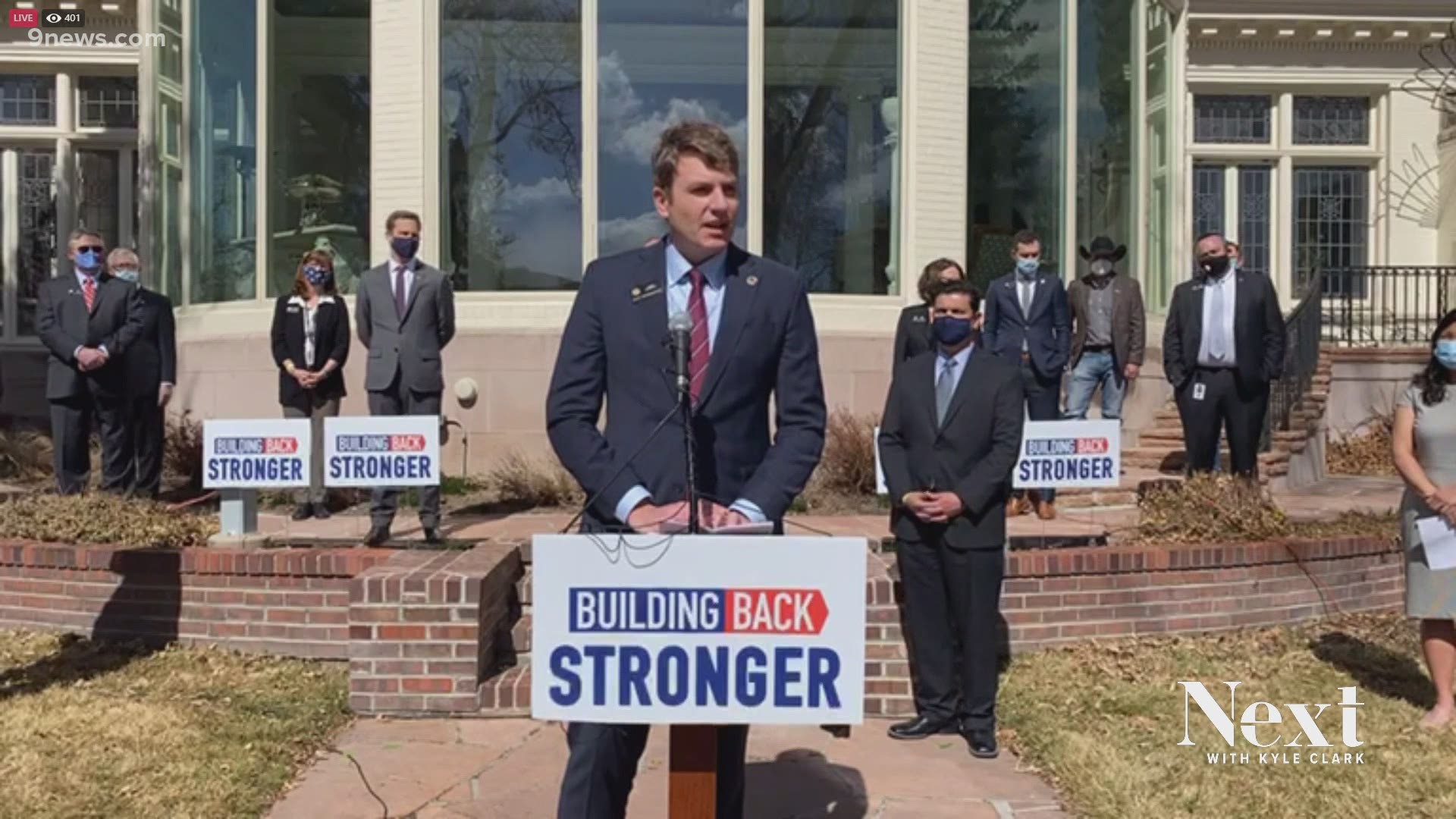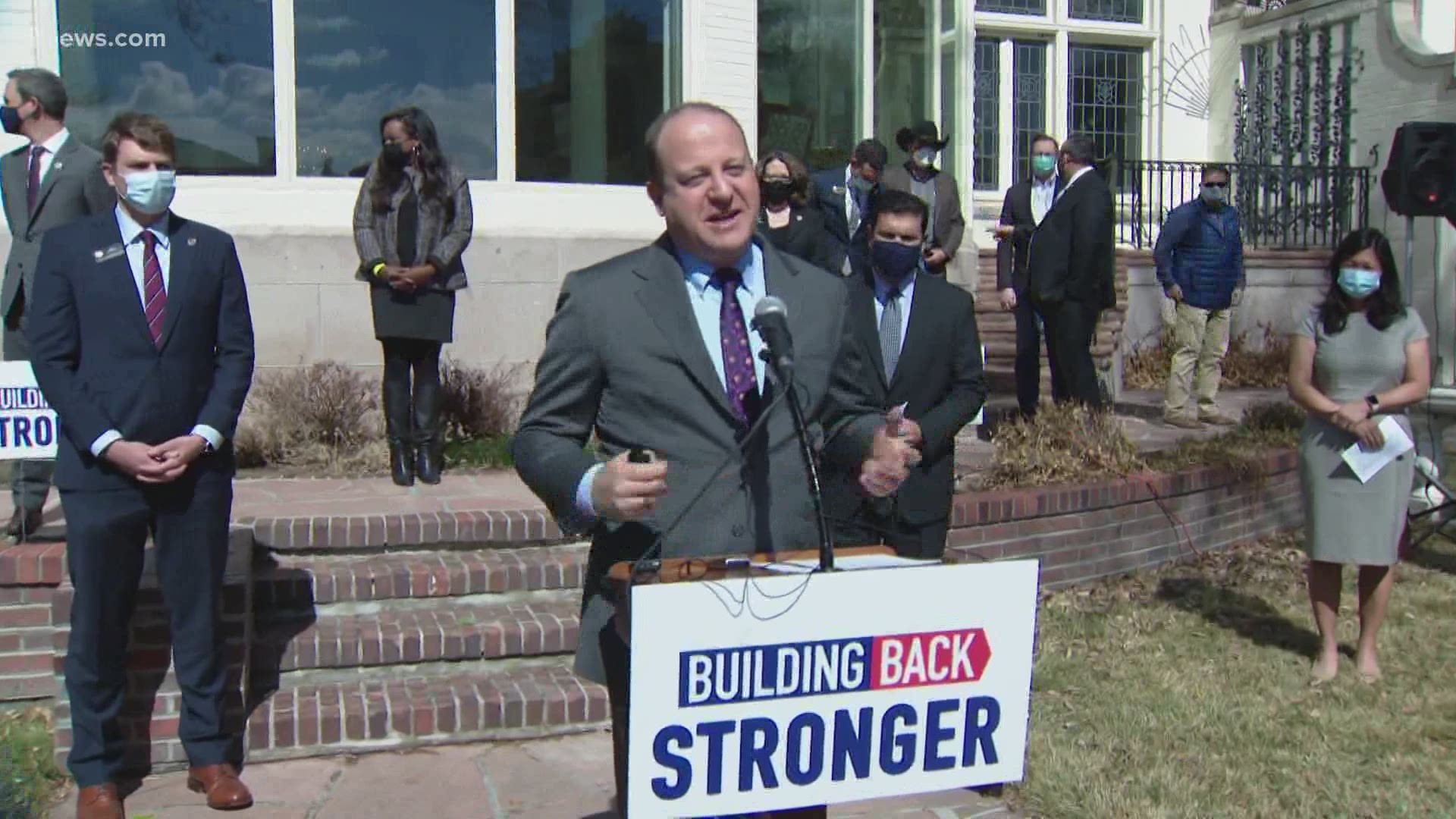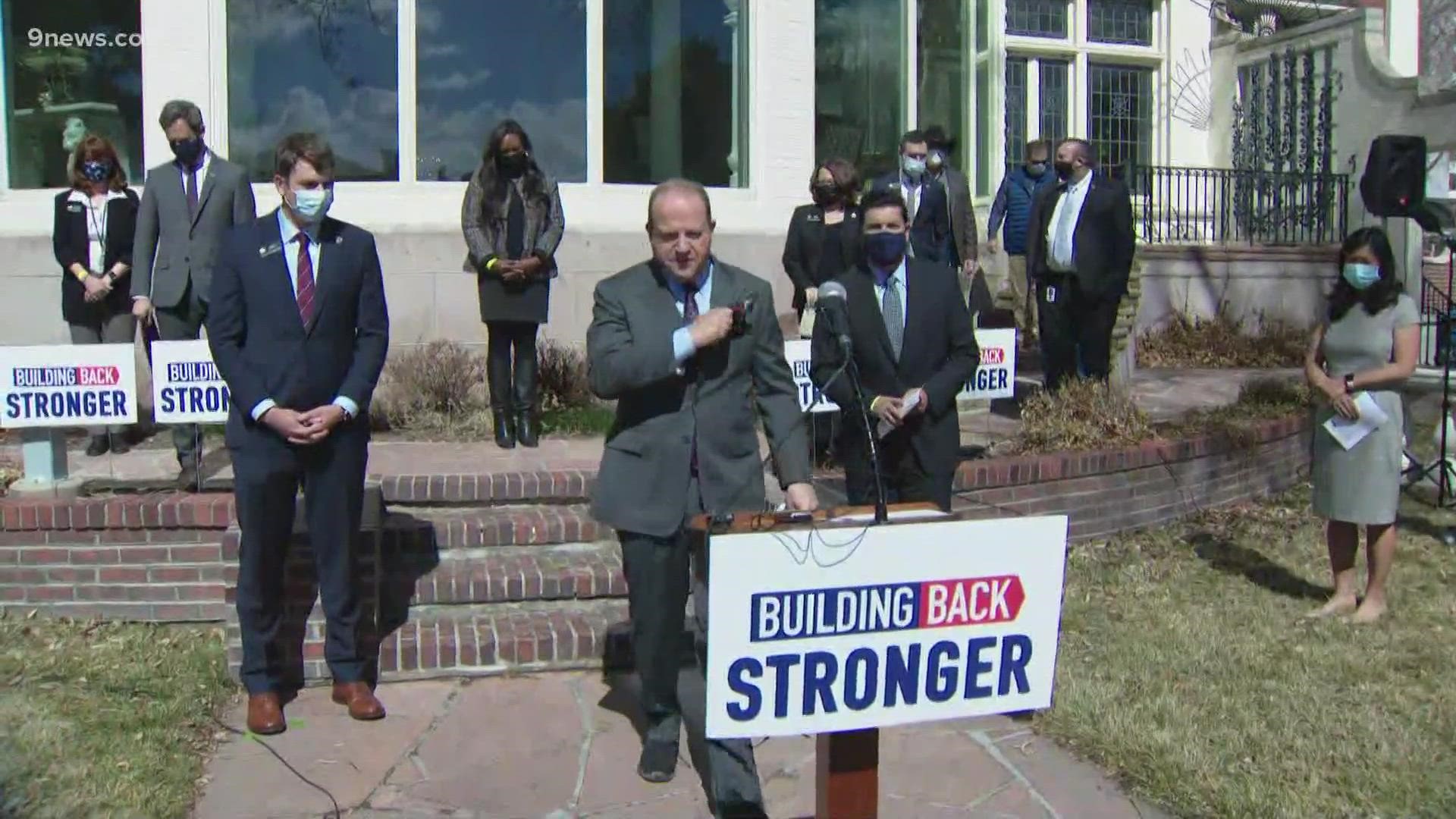DENVER — Just as Congress gave final passage to the $1.9 trillion stimulus package that includes $1,400 direct payments for many Americans, Colorado political leaders surprised with their own stimulus.
Gov. Jared Polis (D) and legislative leaders in both parties announced the "Build Back Stronger" stimulus.
Spoiler alert, Colorado's version does not include direct payments to residents.
The plan calls for about $700 million in state spending.
"This product being presented today is the work of long hours, many sleepless nights," said Polis.
Where did the money come from?
Last year, legislators had to cut $3.5 billion from the state budget.
That turned out to be too much.
"It looks like things weren't as bad as we thought they would be. Maybe the right cut would have been about $2.5 billion," said State Sen. Chris Holbert, R-Parker, Senate Minority Leader.
The plan presented in a group news conference on Wednesday afternoon will focus on the following five main goals:
- Strengthening small businesses
- Revitalizing our infrastructure
- Supporting Colorado families
- Investing in rural Colorado
- Developing our workforce
The governor hinted at pandemic relief during his State of the State address last month and said it would focus on things like tax relief and loans for small businesses, boosting industries like tourism and renewable energy, and investing in improving transportation infrastructure.
“I want to thank the legislature for their collaborative work on this important package of legislation," Polis said. "These one-time, strategic investments will help Coloradans get back to work and not only make important investments in our infrastructure and workforce today, but help keep us moving forward together for years to come.”
The announcement, with members of both political parties, was still political.
Every dollar spent needs to be presented as a bill that must pass through the legislature before getting to the governor's desk.
"Senate Republicans are focused on three items: getting people back to work, getting students back to school and roads and bridges," said Holbert. "If a bill wanders outside of those three priorities, we would encourage that we take whatever dollars are allocated to that and probably focus on those three priorities."
The biggest chunk is set to be allocated for roads and bridges, 25% of the entire stimulus.
$170 million would be primarily for bridges along I-70 on the western part of the Denver Metro Area, and for improvements at the Eisenhower-Johnson Tunnels.
A breakdown of the spending ideas is below.
"We actually want to make sure that everything we do can help somebody who's sitting down at the kitchen table to say, 'how are we going to pay the bills next week?'" said House Minority Leader State Rep. Hugh McKean, R-Loveland.
McKean said this stimulus is an opportunity for Republican ideas to be heard that were not considered during the special legislative session in December.
Not all ideas have bipartisan support, though.
There's $60-$80 million planned for affordable housing and downtown revitalization that McKean believes is more of a local government issue.
Another $10-$15 million would be set aside for local governments to rent hotel or motel space for people experiencing homelessness.
Small Business
Energize Colorado Gap Fund- $10-15 million
The Energize Colorado Gap Fund provides relief in the form of one-time grants to small businesses across the state. To qualify for the grant program, businesses must have less than 25 employees. The fund prioritizes applicants in rural areas, businesses that did not qualify for the Paycheck Protection Program, women, minority and veteran-owned businesses, as well as small restaurants.
Arts and Culture - $3-5 million
Funding will provide additional support to the arts & culture organizations central to communities across Colorado to help bridge their recovery while the state works to vaccinate the broader population.
Restaurant Sales Tax Relief- $40-50 million
The proposal would extend the ability of small restaurants and bars to retain sales tax revenue in lieu of remitting the funds to the state to help keep more dollars in restaurants’ pockets that can be used to sustain operations.
Incentivize events and conferences - $10 million
Funding to incentivize and retain events in Colorado in 2021 through a 10% credit against the hard costs of hosting a meeting or event through 2021. Those costs could include hotel rooms, food & beverage, and audiovisual expenses.
Advanced Industry Grant Program - $10 million
Funding for the Advanced Industries Accelerator Grant Program for businesses that can accelerate Colorado’s recovery by creating high-paying jobs, directly contributing to our public health efforts and help maintain our diversified economy. (This was included in SB21-042).
Oedit Strategic Fund- $15 million
Incentives to businesses that provide new jobs and stimulate the economy. (This is included in SB21-042).
Colorado Startup Loan Fund- $20 - 30 million
Funds to Community Development Financial Institutions (CDFIs) that lend money to historically underserved entrepreneurs for starting up new businesses to fill the needs created by business closures due to COVID-19 and promote an equitable recovery
Economic gardening - $2-3 million
Funding to foster the growth of existing companies that have moved from the start-up stage into the second-stage and/or are on the verge of rapid growth or profitability. Funding would prioritize historically underserved entrepreneurs
Infrastructure
Shovel Ready Infrastructure Projects- $170 million
Support infrastructure improvements in tourism corridors and scenic byways, wildlife migration corridor enhancements, Denver Metro West 1-70 bridges, and improvements to the Eisenhower-Johnson Memorial Tunnels.
Revitalizing Main St. - $30 million
Funds to support infrastructure projects that provide open spaces for mobility, community activities, and economic development in the wake of the COVID-19 emergency (this is included in SB21-110).
Innovative Housing and Community Revitalization - $60-80 million
Matching funds to transform downtown spaces and create more sustainable affordable housing in urban areas. As the cost of living continues to rise in Colorado, many families are being forced out of their homes. So ensuring urban areas have adequate affordable housing options as well as safe community spaces is critical to maintaining the vibrant diversity and longevity of our city centers.
Access to State Parks - $20 million
Funds would allow the Department of Natural Resources to construct, rehabilitate, and improve infrastructure and facilities at 12 state parks, including accelerated buildout of Fishers Peak State Park. (SB21-112)
Broadband Investments- $50-75 million
Funding would expand broadband infrastructure in response to the social and economic disruption caused by the COVID-19 pandemic.
State Water Plan Projects - $10- 20 million
One-time additional funds to complete projects identified in the State’s Water Plan.
Clean Energy Finance - $30-40 million
Funding for several existing programs within the Colorado Energy Office, including the CO Clean Energy Fund, the New Energy Improvement District, and the Residential Energy Upgrade Loan program to scale their impact and drive economic activity.
RENEW Grant for Local Governments - $2-5 million
Funds for the RENEW grant program, which provides local governments with funds to invest in clean energy projects like community solar gardens or EV charging stations.
Weatherization and Resiliency Grants- $3-5 million
Funding for the Weatherization Assistance Program (WAP), which offers cost-effective energy efficiency services to Colorado's low-income residents. These projects reduce wasted energy and lower costs while improving the overall comfort and safety of a home year-round.
Supporting families
School Tutoring/Summer School - $10-15 million
Funding for extended learning opportunities, such as tutoring assistance, for the most vulnerable K-12 students to help close educational gaps exacerbated by the pandemic.
Mental Health Screenings in Schools - $8-9 million
Funding to implement statewide voluntary screenings and provide three free telehealth interventions for students 12 and older. Addressing the socio-emotional needs of young people is imperative--educators are reporting an increased need for mental health support for students struggling during the pandemic.
Mental Health Hotline- $1-2 million
Funding for the hotline for unemployed individuals to provide assistance to access behavioral health services through their insurance, Medicaid, or state-funded services. If no payer exists, the hotline will assist the caller in getting enrolled in benefits for behavioral health, Medicaid, SNAP, or other state assistance.
Childcare Business Support- $10-15 million
Funds for new child care facility space to help fill vacant buildings and meet our expanding needs for high-quality child care. Finding quality, affordable childcare is one of the single greatest challenges for working families, and the pandemic has only made it more difficult.
Program to purchase, or rent rooms in, hotels for the homeless- $10-15 million
Funds for local governments to rent hotel rooms, purchase, or lease-to-purchase hotels and motels for people experiencing homelessness.
Affordable Housing Incentive Program _ $8-10 million
Seed funds for a program that would incentivize local governments to adopt policies from a menu of time-tested options to help further affordable housing development Examples of menu times include: reducing building permit fees for affordable housing units, creating a vacant property registration for the development of affordable housing, or authorization of cluster zoning.
BEST Grant Projects - $10 million
Funds for Building Excellent Schools Today (BEST) grant projects for school construction that did not receive funding in the 2019-2020 grant cycle to help make sure all of our schools are great places for students to learn.
Rural Colorado investment
Wildfire Recovery and Risk Mitigation Grants - $10-25 million
Funds to support several thousand acres of shovel-ready forest restoration projects to protect communities, property and infrastructure in the wildland-urban interface from wildfire.
Watershed Restoration Grant Program - $10-24 million
Funds to protect and preserve Colorado watersheds and defend against wildfire.
Just Transition/Rural Economic Diversification - $10-15 million
Funding to partner with local communities to create new job opportunities and assist in the transition away from coal. Funding can be used for infrastructure investments or workforce training opportunities.
REDI Grants - $3-5 million
Funds for the Rural Economic Development Initiative (REDI) program, designed to help rural communities comprehensively diversify their local economy and create a more resilient Colorado.
Rural Jump-Start - $3 million
Additional funding toward the Rural Jump-Start program to attract businesses and incentivize job creation in rural Colorado.
Support of Stock Show, State Fair, etc - $7-10 million
Funds to sustain events that are critical to our local economies.
Investments in Ag supply chains - $25-30 million
Competitive grants for rural agriculture infrastructure investment, including processing plants, storage, and distribution, to help diversify the supply chain for traditional agriculture products and promote Colorado’s emerging crops like hemp.
Investments in ACRE3 - $3-5 million
Investment in renewable energy and energy efficiency (ACRE3) grants to support Colorado’s agricultural producers and processors in reducing their energy costs.
Investments in Drought Response - $2-5 million
Funding to help Colorado's farmers and ranchers prepare for and respond to the devastating impacts of severe drought.
Funding for Colorado Proud - $2-3 million
Assistance for small-and medium-sized agricultural producers to develop new markets and expand through the Colorado Proud program.
Workforce development
Educator Licensure Fees - $3-4 million
Funding to help provide regulatory relief for hardworking educators by HB21-1104 sponsored by Reps. McLachlan & Larson, extending the renewal period for teacher licensure from 5 to 7 years.
Workforce Centers & Training Awards - $15-25 million
Funding for two-year grants to local workforce boards to help provide training awards and wraparound worker supports to help lead to industry-recognized credentials in the “top jobs” in growing employment sectors as defined in the 2020 Talent Pipeline report.
COSI Displaced Workers - $10-15 million
Funding for the Colorado Opportunity Scholarship Initiative (COSI)’s Displaced Workers program to help provide scholarships and wraparound support for Coloradans with some college but no degree. This funding would also include funding for scaling high-demand programs at community colleges.
Energy Career Pathways - $3-5 million
Funding for a career pathway for the energy sector through a network of the Colorado Work Force Development Council, local work force boards, the CO Department of Education, superintendents of local school districts, the state board for community colleges and occupational education, and other postsecondary partners.
SNAP Employment and Training $2-4 million
Increased investment into Colorado’s SNAP Employment and Training program, known as Employment First, which serves SNAP recipients through skills training and work-related education and training activities.
Professional Training for Success Re-entry - $1-3 million
Funding for professional training, small business lending, and other types of support for formerly incarcerated individuals for successful reentry.
SUGGESTED VIDEOS: Local stories from 9NEWS



